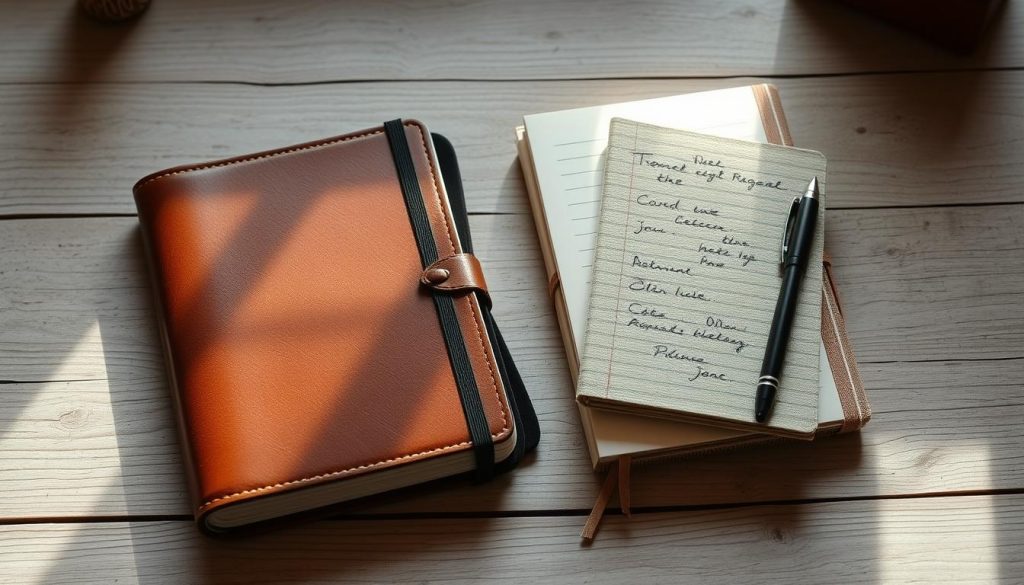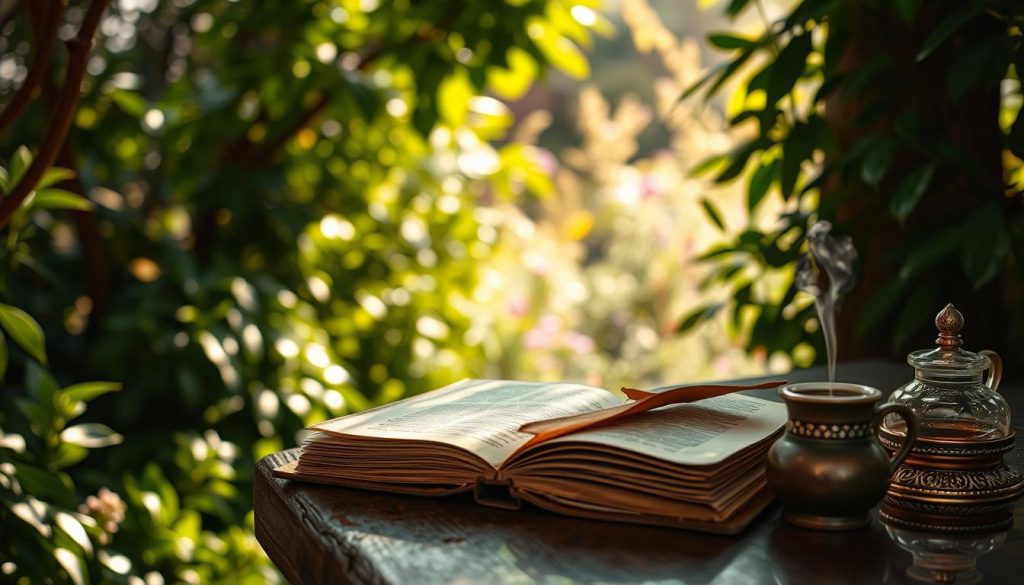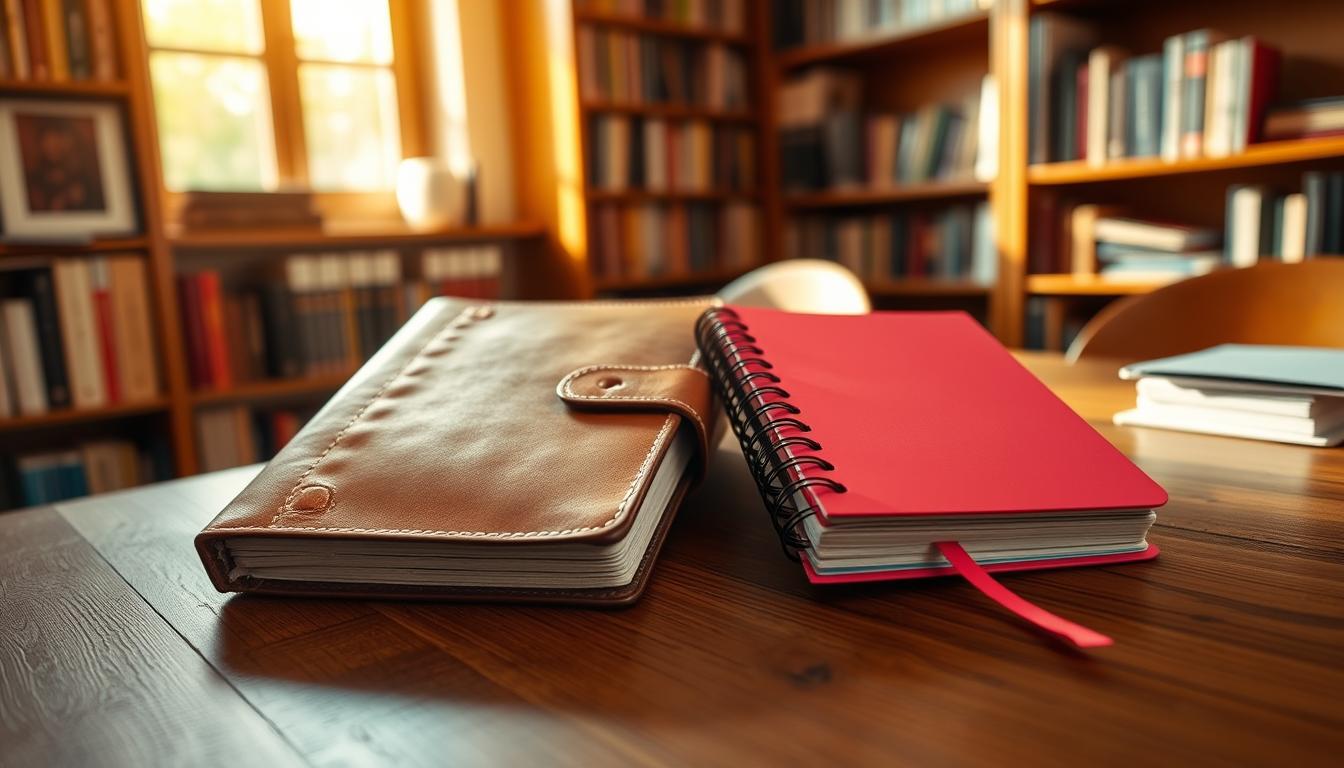Ever looked at a blank page and wondered if it’s a journal or diary? Many people mix up these terms, but there are key differences. These differences can change how you write.
Writing is a powerful way to discover yourself and improve your mental health. Studies show that 88% of people feel better after journaling. The differences between journals and diaries affect how we think and feel.
Knowing the differences can help you pick the best way to reflect on yourself. Whether you want to release emotions or track goals, understanding journals and diaries can help. It makes your writing more meaningful.
Journals and diaries are both places to write down your thoughts. But they serve different purposes. Journals focus on themes, goals, or reflection. Diaries are for daily events and personal stories.
Research shows journaling is more beneficial than diary-keeping. You can use different types of journals, like gratitude or dream journals. This lets you write for specific goals and growth.
Understanding the Basics of Journals and Diaries
Writing has been a powerful tool for human expression for centuries. From ancient Egyptian records to today’s digital platforms, documenting personal experiences has evolved. Knowing the differences between journals and diaries helps us understand their unique roles and writing habits.
Looking into personal documentation, we find journals and diaries are not the same. Each has its own purpose in recording human experiences.
Defining a Journal
A journal is a flexible space for personal exploration and creativity. It’s not just about writing; it’s about expressing yourself freely. Journals are where thoughts turn into insights.
- Self-reflection and personal growth
- Creative brainstorming
- Problem-solving strategies
- Goal tracking and personal development
“Journals are the canvas where thoughts transform into insights.” – Anonymous
Defining a Diary
Diaries are about keeping a record of daily events in chronological order. They focus on documenting personal experiences with exact dates. The key features include:
- Date-specific entries
- Narrative of personal events
- Detailed daily recollections
- Strict sequential documentation
| Journal Characteristics | Diary Characteristics |
|---|---|
| Flexible format | Structured chronology |
| Multiple writing styles | Consistent daily entries |
| Creative expression | Personal event recording |
About 1 in 6 people use diaries and journals regularly. This shows how important they are for personal growth and understanding. Read more about journals vs diaries and their benefits.
Purpose: Why People Use Journals and Diaries
People use journals and diaries for personal and growth reasons. These tools help with self-expression, emotional processing, and personal growth.
Reflective vs. Personal Use
Journaling tips show different reasons for writing. While 70% write for privacy, others have different goals:
- Self-reflection and emotional processing
- Goal tracking and personal development
- Creative expression and exploration
Creative Expression and Organization
Journaling does more than just record events. Studies show 85% of journal entries offer deeper insights than regular diary entries.
| Journal Purpose | Percentage of Users |
|---|---|
| Personal Growth | 65% |
| Emotional Healing | 45% |
| Creative Expression | 54% |
“Journaling is a powerful tool for understanding oneself and navigating life’s complexities.” – Mental Health Expert
Daily writing changes lives. 86% of adults find it helps with mental health, like stress relief and emotional support.
Journals and diaries are great for daily inspiration or exploring your inner self. They provide personal spaces for growth and reflection.
Structure: How Journals and Diaries Differ
Knowing the differences in structure between journals and diaries helps you pick the best one for you. Both are tools for personal recording, but they have distinct formats.

Journals are more flexible than traditional diaries. They allow for many ways to express yourself:
- Bullet point formats
- Unstructured lists
- Mixed media entries
- Non-chronological writing
Journal Formats: Exploring Creative Approaches
There are many journal types to choose from, each with its own way to record your life. Creativity is key when picking a journal. Some popular styles include:
- Gratitude journals
- Dream journals
- Idea capture journals
- Visual art journals
“A journal is a personal sanctuary where rules are meant to be broken and creativity knows no boundaries.”
Diary Formats: Structured Daily Narratives
Diaries have a strict structure, focusing on recording events in order. They usually have:
- Pre-printed date sections
- Daily entry expectations
- Sequential event recording
- Consistent emotional tracking
Studies show that while diaries stick to a daily format, journals are more flexible. They help with personal growth and exploring emotions.
Emotional Aspects: Capturing Feelings and Thoughts
Writing about your emotions can help you understand yourself better. A reflection journal is a safe place to explore your inner world. It helps you process your feelings and experiences.

Journaling is becoming a key way to improve mental health. Studies show that 76% of people find emotional relief by writing regularly. It’s more than just keeping a diary.
Understanding Emotional Release Through Writing
Writing about your emotions lets you:
- Explore your feelings without fear of judgment
- Learn more about yourself
- Feel less stressed and anxious
- Understand complex emotions better
The Healing Power of Personal Reflection
About 65% of people say they understand themselves better by writing regularly. A reflection journal is not just a diary; it’s a tool for healing.
“Writing is a form of therapy; sometimes I wonder how all those who do not write, compose, or paint can manage to escape the madness, melancholia, the panic and fear which is inherent in a human situation.” – Graham Greene
Writing helps you turn feelings into clear insights. By writing down your experiences, you track your growth and emotional development.
Strategies for Effective Emotional Journaling
- Write without worrying about what others think
- Face tough emotions head-on
- Reflect regularly
- Use prompts to dive deeper
Journaling does more than just help you feel better right away. It can also make you more mindful by up to 30%. This makes it a powerful tool for personal change.
Frequency of Use: How Often You Write
Writing habits are key to personal growth and self-understanding. How often you write can greatly affect your emotional development and self-awareness.

Everyone has their own way of journaling and diary writing. Some write every day, while others write when they feel like it.
Journal Practices: As Needed or Regularly
Journal writing can be done at any frequency. You can make writing habits that fit your style and goals. Here are some tips for regular journaling:
- Set realistic writing goals
- Choose a comfortable time of day
- Create a dedicated writing space
- Start with short sessions
“Writing is a powerful tool for self-discovery and personal growth.” – Anonymous
Diary Habits: Daily Notes and Recaps
Diaries are for more structured daily writing. They record your immediate feelings and experiences. About 1 in 6 people keep up with diary or journal writing.
| Writing Type | Frequency | Purpose |
|---|---|---|
| Journals | Flexible (multiple times/week) | Reflection and Goal Setting |
| Diaries | Daily Entries | Documenting Daily Experiences |
Your writing habits can change over time. The important thing is to find a rhythm that supports your growth.
Content: What Goes Into Each
Looking into journaling techniques shows us how journals and diaries are different. Each way of writing captures personal stories in its own special way. They offer different paths to share our inner thoughts.

Journals: Goals, Ideas, and Reflections
Journals are all about deep thinking and growing as a person. People use them to:
- Track personal goals and dreams
- Brainstorm new ideas
- Think deeply about their experiences
- Work on solving problems
“A journal is a personal tool for growth and self-discovery.” – Writing Expert
Diaries: Personal Experiences and Events
Diaries tell stories of everyday life in detail. They act as personal histories, recording our life’s journey.
| Journal Focus | Diary Focus |
|---|---|
| Future-oriented goals | Past and present events |
| Reflection and analysis | Chronological storytelling |
| Personal development | Emotional documentation |
Choosing between journals and diaries, both are powerful journaling techniques for exploring ourselves.
Audience: Who Reads Your Journal or Diary
Writing in a journal is a very personal thing. It makes us think about who might see our words. Most people write for themselves, with a clear idea of who might read it.

- 83% of people see their journals as a private space
- 68% have thrown away their journals because of privacy worries
- 57% write thinking about who might read it later
Private Journals: For Your Eyes Only
Private journals are a special place for thinking about ourselves. About 72% of people use them to track their progress. These journals are kept secret, where we can share our true feelings and growth without fear of judgment.
Diaries: Sharing with Friends and Family
Some people like to share their diaries with others. A surprising fact is that 65% see their journals as a part of their legacy. This might make them want to keep and sometimes share their writings.
| Journaling Type | Privacy Level | Potential Sharing |
|---|---|---|
| Personal Journal | Highly Private | Rarely Shared |
| Memoir-style Diary | Selective Privacy | Potentially Shared |
“Your journal is your unedited version of life, a conversation with yourself.” – Unknown
Whether to keep your writing private or share it is up to you. It depends on how comfortable you are, what you want to achieve, and how open you’re willing to be.
Styles: Creative Approaches to Writing
Exploring creative journaling techniques opens up a world of self-expression and artistic discovery. Nearly 70% of individuals practicing creative diary writing find it increases their artistic and personal creativity.
Art journaling turns traditional writing into a vibrant visual experience. Unlike standard journals, art journals blend multiple creative elements. They capture emotions and experiences in a unique way.
Art Journals: Beyond Traditional Writing
Creative writing in art journals goes far beyond simple text. These dynamic spaces combine:
- Watercolor illustrations
- Collage elements
- Mixed media techniques
- Personal sketches
Creative Diaries: Expanding Personal Expression
Creative diaries serve as powerful tools for artistic exploration. Journaling techniques in these formats allow individuals to experiment with unconventional documentation methods.
“Creativity is intelligence having fun” – Albert Einstein
Art journaling provides a unique platform for personal storytelling. By integrating visual and written elements, you transform ordinary experiences into extraordinary narratives.
Whether you’re an artist or simply seeking creative self-expression, art journaling offers an innovative approach to documenting life’s journey. Embrace your creativity and let your journal become a canvas of personal exploration.
Popular Tools: Apps and Formats for Each
Digital journaling has changed how we keep our thoughts. Now, journaling apps and digital diaries make writing easier than ever.
Today’s digital diaries have features that paper journals can’t. They offer advanced writing tools that make journaling better.
When picking journaling apps, look for cloud syncing, multimedia support, and privacy protection. The right app can change your writing and help keep your thoughts and memories.
“Technology has made personal journaling more accessible and engaging than ever before.” – Digital Wellness Expert
Conclusion: Choosing Between a Journal and a Diary
Understanding the difference between a journal and a diary depends on your personal writing habits and goals. Both offer powerful tools for self-discovery. The key is finding what works best for you.
Digital and paper options both have their benefits. Some like the feel of a paper diary, finding it calming. Others enjoy digital platforms for their multimedia features. Choose based on what feels right to you.
Studies show writing regularly can boost mental health and self-awareness. Whether you pick a journal or diary, keep writing regularly. This helps you explore your thoughts and grow emotionally.
There are no hard and fast rules in personal writing. Many use both journals and diaries. Try different styles, find your voice, and see what works best for you.
When to Choose a Journal
Choose a journal for a structured way to track goals and ideas. Journals are great for organized progress tracking, brainstorming, and planning.
Making the Best Choice for Your Needs
Your writing tool should feel natural and encourage you to write often. Think about your goals, writing style, and how much detail you want to include.
FAQ
What is the primary difference between a journal and a diary?
A journal is more flexible, focusing on reflection and personal growth. It explores ideas freely. On the other hand, a diary is a daily record of personal experiences and events. It follows a chronological format.
Can I use a journal and a diary interchangeably?
While they share some similarities, they serve different purposes. Journals are for creative expression, goal-tracking, and introspection. Diaries are for documenting daily life in a structured way.
How often should I write in a journal or diary?
Journals can be written in as often as you like. Diaries, though, are best done daily. Choose a frequency that works for you.
Are journals and diaries meant to be private?
Both are personal writing tools. Journals are usually private, focusing on personal growth. Diaries might be shared with close ones, but many keep them private.
What are some benefits of journaling and diary writing?
Both offer mental health benefits. Journaling aids in goal-setting and self-reflection. Diary writing documents personal history and helps with emotional release.
Can I use digital tools for journaling and diary writing?
Yes! Digital apps offer advanced journaling and diary tools. They’re convenient, secure, and feature-rich.
How do I choose between a journal and a diary?
Think about your writing goals. Journals are for exploring ideas and personal growth. Diaries are for documenting daily life.
Are there different types of journals and diaries?
Yes! Journals include art, bullet, gratitude, and reflection types. Diaries range from daily logs to travel and themed journals.
Do professional writers use journals and diaries?
Many writers use journals for brainstorming and idea capture. Diaries help document personal experiences for future writing.
How can I make journaling or diary writing a consistent habit?
Start small by setting a daily time. Keep your journal or diary handy. Choose a format you like. Brief, consistent writing is beneficial.
Source Links
- Journaling vs. Diary: Exploring the Differences and Similarities
- Diarly — Secure, simple & beautiful diary app.
- Journal vs Diary Writing: What is the Difference?
- Journal vs. Diary: The Art of Personal Writing
- Diary vs Journal: Similarities & Differences
- Notebook vs Journal: What’s the Difference? | CN+J
- Journey.Cloud – Free Online Journal & Diary
- diary vs. journal : two differences
- Diary vs Journal: What’s the Difference?
- Diary vs Journal: Exploring the Differences – Honeyoungbook
- Diary vs Journal: Key Differences and Choosing the Right One for You
- Diary vs Journal: Similarities & Differences
- The Difference Between Keeping a Diary, Journaling, and Reflecting | Online Journal and App by Reflection.app
- Diary vs. Journal: What’s The Difference? (Answer + Examples)
- Who will read your personal journals? — Modern Heirloom Books
- Diary Studies: Understanding Long-Term User Behavior and Experiences
- Diary vs Journal Unveiling the Best Writing Companion for You-SYLOON
- 13 different ways to write in a diary or journal
- Journal, Diary, What’s the Difference?
- Best Journal Apps for 2025: A Side-by-Side Comparison
- Best 6 Journal Apps and AI Tools for Personal Diaries in 2024
- 10 Digital Journal Apps for Bullet Journaling in 2025 | ClickUp
- How to Write And Keep a Journal: Mastering the Art of Diary Writing – Memory Hive

